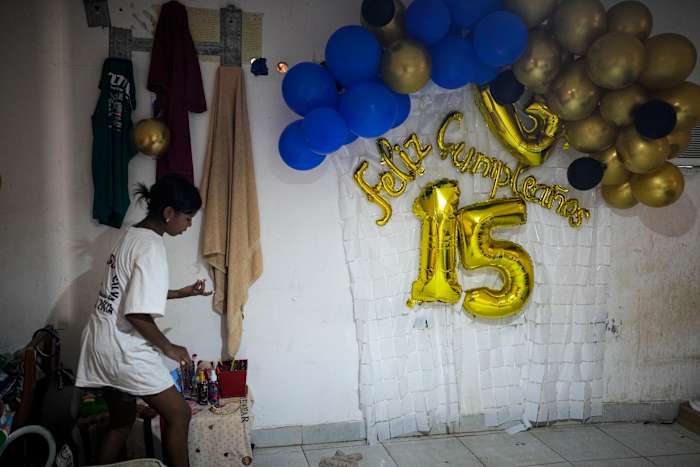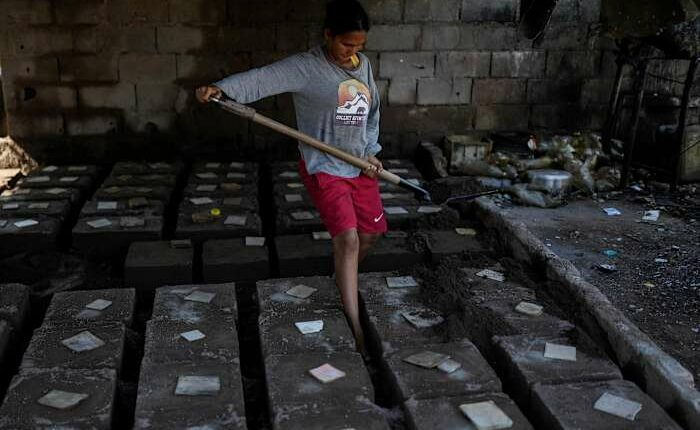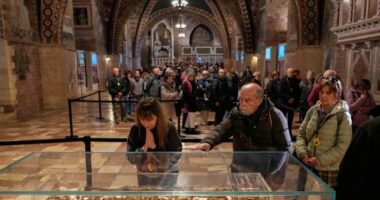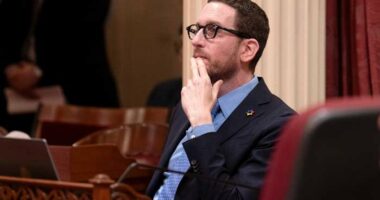Share this @internewscast.com

MARACAIBO – Yosbelin Pérez has crafted countless aluminum cooking pans, or “budare,” essential for making arepas, a staple in Venezuelan households from rural to urban settings. Despite her years of work in the cookware business, she doesn’t own anything of real value.
Pérez currently faces a debt of about $5,000 due to her family’s unsuccessful attempt to reach the United States, where they sought refuge from Venezuela’s deepening political, social, and economic turmoil. Now, alongside many others who have returned to Venezuela, they are beginning anew as the country’s crisis continues to deepen.
“When I made the decision to leave in August, I liquidated everything: my house, personal items, car, even the assets in my factory — molds, sand. I was left with nothing,” expressed Pérez, 30, from her in-laws’ home in western Venezuela. “We reached Mexico, stayed for seven months, and when President (Donald Trump) took office in January, I decided it was time to move.”
She, her husband and five children returned to their South American country in March.
COVID-19 pandemic pushed migrants to the U.S.
Since 2013, over 7.7 million Venezuelans have left the country as its oil-centric economy collapsed. While many settled in Latin American and Caribbean nations, the U.S. emerged as a beacon of hope for better opportunities following the COVID-19 pandemic.
A significant number of Venezuelans accessed the U.S. through programs granting work permits and deportation protection. However, these protections were rescinded starting January, as President Donald Trump pursued stricter immigration policies to fulfill his campaign commitments.
Initially resistant to accepting deported citizens, Venezuelan President Nicolás Maduro altered his stance earlier this year due to pressure from the White House. Consequently, deported individuals now frequently arrive at the airport near Caracas on flights by a U.S. government contractor or the Venezuelan state airline.
The U.S. government has defended its bold moves, including sending more than 200 Venezuelans to a prison in El Salvador for four months, arguing that many of the immigrants belonged to the violent Tren de Aragua street gang. The administration did not provide evidence to back up the blanket accusation. However, several recently deported immigrants have said U.S. authorities wrongly judged their tattoos and used them as an excuse to deport them.
Maduro declared ‘economic emergency’
Many of those returning home, like Pérez and her family, are finding harsher living conditions than when they left as a currency crisis, triple-digit inflation and meager wages have made food and other necessities unaffordable, let alone the vehicle, home and electronics they sold before migrating. The monthly minimum wage of 130 bolivars, or $1.02 as of Monday, has not increased in Venezuela since 2022. People typically have two, three or more jobs to cobble together money.
This latest chapter in the 12-year crisis even prompted Maduro to declare an “economic emergency” in April.
David Rodriguez migrated twice each to Colombia and Peru before he decided to try to get to the U.S. He left Venezuela last year, crossed the treacherous Darien Gap on foot, made it across Central America and walked, hopped on a train and took buses all over Mexico. He then turned himself in to U.S. immigration authorities in December, but he was detained for 15 days and deported to Mexico.
Broke, the 33-year-old Rodriguez worked as a mototaxi driver in Mexico City until he saved enough money to buy his airplane ticket back to Venezuela in March.
“Going to the United States … was a total setback,” he said while sitting at a relative’s home in Caracas. “Right now, I don’t know what to do except get out of debt first.”
He must pay $50 a week for a motorcycle he bought to work as a mototaxi driver. In a good week, he said, he can earn $150, but there are others when he only makes enough to meet the $50 payment.
Migrants seek loan sharks
Some migrants enrolled in beauty and pastry schools or became food delivery drivers after being deported. Others already immigrated to Spain. Many sought loan sharks.
Pérez’s brother-in-law, who also made aluminum cookware before migrating last year, is allowing her to use the oven and other equipment he left at his home in Maracaibo so that the family can make a living. But most of her earnings go to cover the 40% monthly interest fee of a $1,000 loan.
If the debt was not enough of a concern, Pérez is also having to worry about the exact reason that drove her away: extortion.
Pérez said she and her family fled Maracaibo after she spent several hours in police custody in June 2024 for refusing to pay an officer $1,000. The officer, Pérez said, knocked on her door and demanded the money in exchange for letting her keep operating her unpermitted cookware business in her backyard.
She said officers tracked her down upon her return and already demanded money.
“I work to make a living from one day to the next … Last week, some guardsmen came. ‘Look, you must support me,’” Pérez said she was told in early July.
“So, if I don’t give them any (money), others show up, too. I transferred him $5. It has to be more than $5 because otherwise, they’ll fight you.”
Copyright 2025 The Associated Press. All rights reserved. This material may not be published, broadcast, rewritten or redistributed without permission.










